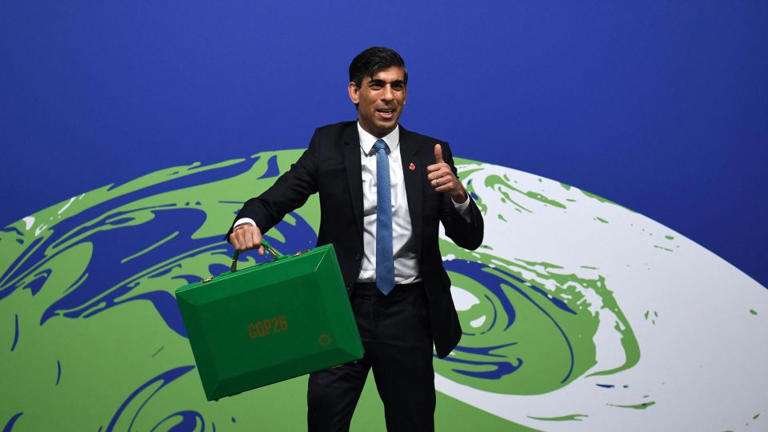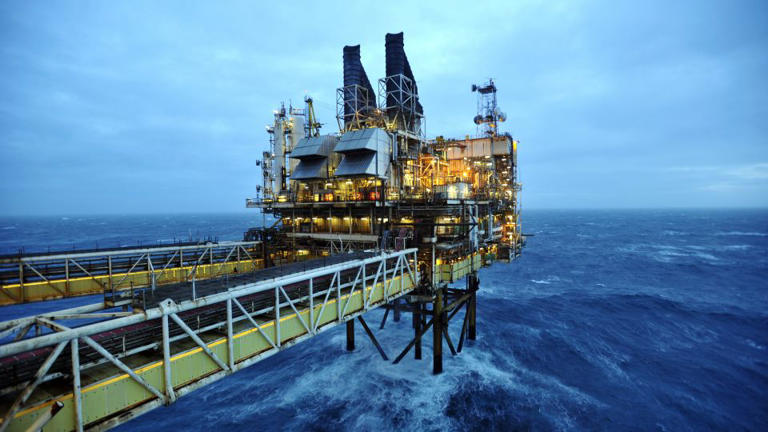Story by Analysis by Rob Picheta, CNN •
Less than two years ago, Britain was championing itself as a global leader in the fight against the climate crisis.
At the pivotal COP26 climate conference in Glasgow, then-Prime Minister Boris Johnson rallied world leaders to find agreement on a historic resolution acknowledging the role of fossil fuels in the climate crisis, and the late Queen Elizabeth II said in a landmark speech that “time for words has now moved to the time for action.”
Things feel very different now. As Rishi Sunak’s beleaguered government limps towards an election it is widely expected to lose, determination has seemingly been swapped for division.
And after a decade of cross-party consensus on tackling the climate crisis, experts fear that Sunak has identified green policies as a new wedge issue that could help reverse his party’s sagging fortunes.
Sunak said Monday he wants to “max out” oil and gas developments in Britain’s North Sea, announcing an expansion in drilling for the fossil fuels that environmental groups have condemned.
The move followed a proclamation from Sunak to Britain’s drivers, in the Telegraph newspaper, that he was “on their side,” as he ordered a review of “anti-motorist” low-traffic neighborhoods created to improve urban air quality.

Sunak poses during COP26. Since becoming prime minister, critics say he has diminished the UK's standing as a leader on the climate. - DANIEL LEAL/AFP/Getty Images© Provided by CNN
Jibes towards climate activists have meanwhile become a common feature at the despatch box in parliament. And in combative interview exchanges on Monday, Sunak defended his frequent use of a jet or helicopter to attend events around the UK – a habit that opposition politicians have often criticized.
“What the government seems to be doing is using the climate to divide the public,” Luke Murphy, the associate director for energy, climate, housing and infrastructure at the progressive IPPR think tank, told CNN. “There does seem to be a degree of political opportunism around what they’ve been doing.”
Few expect the new push to be an election-winner. But Murphy, like many climate experts, fears there are wider ramifications for Britain’s global standing.
“For all the faults of the Boris Johnson government, what you can say is there appeared to be a genuine commitment to net zero and to the climate agenda,” he said.
“Since then we’ve gone backwards. We’ve stalled in many policy areas,” Murphy added. “I don’t think many people would actually now consider the UK to be a global leader (on the climate).”
A populist approach to the climate
Since coming into power, Sunak has been scrambling for wedge issues that could resonate with Britons and turn around his party’s woeful standing with the public. Small boat crossings of asylum-seekers, transgender protections and other so-called “culture war” battles have all been eagerly waged by a prime minister who vowed during his first leadership campaign last year to stop “woke nonsense.”
But amid a deepening cost of living crisis and the decline in Britain’s public services, Sunak has failed to shake the increasingly sticky label applied to him – that he is a caretaker of the managed decline of the Conservative Party, which has ruled for 13 years and is running low on ideas.
A glimmer of hope arrived for Sunak, however, in an unexpected and narrow victory in the by-election to replace Boris Johnson as an MP for Uxbridge, a region on the western fringe of London. The vote was dominated by local opposition to the expansion of London’s world-first low-emissions zone, which gave local Conservatives a rare issue on which they could go on the offensive.
“This campaign is a referendum on ULEZ,” the area’s new MP Steve Tuckwell told CNN in the days leading up to the vote. “We know it’s going to devastate local businesses,” said Tuckwell, who omitted virtually any mention of his party from leaflets and instead branded himself the “anti-ULEZ candidate.”
In the days since that vote, and despite losing a significant share of the votes in the region, leading Conservatives have gleefully picked up the anti-green baton. Ministers have increasingly conflated emissions-slashing agendas with the activist fringes of the climate movement, trying to draw links between the opposition Labour Party and Just Stop Oil, the divisive group known for interrupting national events with guerilla protests.

A Just Stop Oil protester disrupts a match at July's Wimbledon Championships. Sunak's ministers have been attempting to link the group to the Labour Party, which is on course to win the next election. - Hannah Mckay/Reuters© Provided by CNN
Announcing the North Sea drilling expansion on Monday, Energy Secretary Grant Shapps claimed that the opposition Labour Party are the “political wing” of Just Stop Oil, despite the party’s leader Keir Starmer criticizing the group’s tactics. In June, Sunak claimed that “eco-zealots” are writing Labour’s energy policy.
“What you are seeing is a much more populist way of handling (the climate),” Tim Bale, a professor of politics at Queen Mary University in London and the author of books on the Conservatives, told CNN.
“Uxbridge has encouraged the party to feel – in the absence of many other policies that are going well for them – that it’s a move that has some traction with a certain section of voters,” Bale said. More than three-quarters of British households have a car, and the rate of carless households has fallen steadily in recent years.
Making enemies
It is a difficult path for Sunak to tread. Even voters opposed to schemes like ULEZ do not necessarily lack concern about the climate; the topic has become increasingly prevalent in recent years, with nearly two-thirds of Britons consistently ranking it among the most important issues facing the country, according to data from the Office for National Statistics.
London’s Mayor Sadiq Khan has forcefully defended his city’s programs, including ULEZ, which last week survived a legal challenge brought by five Conservative councils. On Sunday, Khan nodded to recent heatwaves and wildfires in Europe, writing: “The world is on fire – and this is all the leadership we’re getting from Rishi Sunak.”
And Sunak’s approach to the climate is increasingly earning him enemies within his own party.
Foreign Office minister Zac Goldsmith resigned in June, lambasting Sunak’s climate policies. “The problem is not that the government is hostile to the environment, it is that you, our prime minister, are simply uninterested,” he wrote in his resignation letter.

A North Sea oil rig off the coast of Scotland. Sunak's decision to expand drilling in the North Sea was criticized by climate experts. -
WPA Pool/Getty Images Europe/Getty Images© Provided by CNN
And on Monday Chris Skidmore, a Conservative former energy minister who is now on the backbenches, said Sunak’s expansion of North Sea drilling puts him on “the wrong side of history.”
Skidmore called the move “the wrong decision at precisely the wrong time, when the rest of the world is experiencing record heat waves.”
But with Britain agitating for a change in leadership and with little else to champion, Uxbridge has apparently given Sunak a blueprint for next year’s election – and waging battles with detractors may help him elevate his pitch.
“There aren’t many obvious other avenues for this government to go down,” Bale, the politics professor, said. “This, like the small boats issue, perhaps provides a bit of a distraction for people.”
“You can see a very obvious parallel with what’s going on with migration,” he added. “That is a typically populist attack line – making a distinction between people on the one hand, and elites on the other.”
For more CNN news and newsletters create an account at CNN.com
And on Monday Chris Skidmore, a Conservative former energy minister who is now on the backbenches, said Sunak’s expansion of North Sea drilling puts him on “the wrong side of history.”
Skidmore called the move “the wrong decision at precisely the wrong time, when the rest of the world is experiencing record heat waves.”
But with Britain agitating for a change in leadership and with little else to champion, Uxbridge has apparently given Sunak a blueprint for next year’s election – and waging battles with detractors may help him elevate his pitch.
“There aren’t many obvious other avenues for this government to go down,” Bale, the politics professor, said. “This, like the small boats issue, perhaps provides a bit of a distraction for people.”
“You can see a very obvious parallel with what’s going on with migration,” he added. “That is a typically populist attack line – making a distinction between people on the one hand, and elites on the other.”
For more CNN news and newsletters create an account at CNN.com
No comments:
Post a Comment